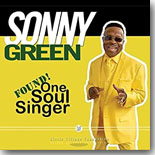 2020
wasn’t a good year for many things, but it was a
great year for soul music fans. There were
several great releases that were guaranteed to
satisfy fans of that genre. One of the best of
the lot came from Sonny Green. The
Louisiana-born singer has been singing since he
was a teenager and has been a part of the Los
Angeles scene for over 40 years, releasing a
handful of singles in the late ’60s/early ’70s,
but he’s only just released his first
full-length album, Found! One Soul Singer
(Little Village Foundation) at age 78.
2020
wasn’t a good year for many things, but it was a
great year for soul music fans. There were
several great releases that were guaranteed to
satisfy fans of that genre. One of the best of
the lot came from Sonny Green. The
Louisiana-born singer has been singing since he
was a teenager and has been a part of the Los
Angeles scene for over 40 years, releasing a
handful of singles in the late ’60s/early ’70s,
but he’s only just released his first
full-length album, Found! One Soul Singer
(Little Village Foundation) at age 78.
Green has a robust and
distinctive soul voice, but you can hear the
influences in his style and his song selection.
The opener, “I’m So Tired,” and “Blind Man” are
from Bobby “Blue” Bland’s catalog, with Green
paying tribute to Bland while giving the songs
his own unique, slightly rawer interpretations,
both of which work superbly. Even better is
Green’s cover of Little Milton’s 1970 hit, “If
Walls Could Talk,” where his own intensity
matches, and maybe exceeds, that of Little
Milton’s original. His read of Syl Johnson’s
mid-’70s Hi hit, “Back For A Taste Of Your
Love,” is magnificent, down to the Hi-like
musical backdrop.
Willie Nelson’s “Are You Sure”
gets a tough but tender performance from Green,
and his delivery proves that the line between
country music and soul music is a razor-thin
one. Green also reprises one of his single
releases, the silky mid-tempo ballad, “If You
Want Me To Keep On Loving You,” from 1971 on the
Hill label (owned by Matt Hill, Z.Z. Hill’s
brother). Meanwhile, on Ted Taylor’s classic “Be
Ever Wonderful,” Green pulls out all the stops,
really giving us a taste of his range with this
excellent take.
Green recorded this session at
Greaseland Studios, with Kid Andersen
contributing guitar on all tracks, and
co-authoring several tunes, including the
humorous “Cupid Must Be Stupid” (co-written with
sax man Terry Hanck and Jojo Russo), and the
funky “Trouble,” where Green shares lead vocals
with Alabama Mike (who co-wrote the song with
Andersen and Russo). Rick Estrin contributes a
pair of songs as well, the slow blues “I Beg
Your Pardon” and the brand new, powerful “I Got
There” (written with Andersen).
In addition to Andersen and
Hanck (who solos on “Cupid Must Be Stupid”), the
band includes Jim Pugh (Hammond B3), Chris Burns
(clavinet, piano), Endre Tarczy (bass), Ronnie
Smith and D’Mar (drums), Mariachi Mestizo
(violins), Mike Rinta (trombone), Jeff Lewis
(trumpet), Aaron Lington and Gordon Beadle
(saxes). They are as successful at replicating
the feel of those vintage soul blues hits as
Green is with his force-of-nature vocals.
If you are a fan of old school
vintage soul and soul-flavored blues, you most
definitely need Found! One Soul Singer in
your collection, and you should be most grateful
that Sonny Green is still with us, hopeful that
he will bless us with even more of his great
music in the near future.
--- Graham Clarke
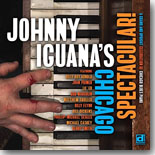 As
far as these ears go, any release by Johnny
Iguana has always been a barrel of fun. The
Chicago piano man grew up on Chicago blues,
playing gigs in his native Philadelphia as a
teenager before being hired by one of his idols,
Junior Wells. He spent three years playing and
recording with Wells, settling in the Windy
City, where he’s played and recorded with
everybody who’s anybody on the Chicago blues
scene. His instantly recognizable piano work
also propels the endlessly creative band, the
Claudettes, who’ve released several “gotta hear
‘em” albums over the past few years.
As
far as these ears go, any release by Johnny
Iguana has always been a barrel of fun. The
Chicago piano man grew up on Chicago blues,
playing gigs in his native Philadelphia as a
teenager before being hired by one of his idols,
Junior Wells. He spent three years playing and
recording with Wells, settling in the Windy
City, where he’s played and recorded with
everybody who’s anybody on the Chicago blues
scene. His instantly recognizable piano work
also propels the endlessly creative band, the
Claudettes, who’ve released several “gotta hear
‘em” albums over the past few years.
Iguana’s latest project is
centered on the blues --- the Chicago variety,
of course. Johnny Iguana’s Chicago
Spectacular! (Delmark Records) is just that
--- spectacular! Over the course of a dozen
tracks, four original instrumentals and eight
tasty covers, Iguana’s dazzling work on the 88s
is augmented by a host of Chicago’s favorite
sons, including John Primer, Billy Boy Arnold,
Lil’ Ed, Bob Margolin, Matthew Skoller, Billy
Flynn, and Kenny Smith.
Iguana breathes new life into
these classic tunes with his bold arrangements
and his diverse, and propulsive piano work.
Primer sings Roosevelt Sykes’ “44 Blues” and
Willie Dixon’s “Down In The Bottom,” backed by
Margolin’s guitar on the first track and playing
guitar himself on the latter. Arnold also sings
on a pair of tracks, Sonny Boy (John Lee)
Williamson’s “You’re An Old Lady” and Big Bill
Broonzy’s “Hot Dog Mama," and Billy boy is
backed by Flynn and Smith on his two tracks.
Lil’ Ed shines on vocals and guitar with Elmore
James’ “Shake Your Moneymaker” and Otis Spann’s
“Burning Fire.”
Other guests include harmonica
player Matthew Skoller, who does a fine job on
harp and vocals with Williamson’s “Stop Breakin’
Down” (backed by Flynn and Smith), and
Phillip-Michael Scales (B.B. King’s nephew), who
does a fine job on vocals and guitar with Gil
Scott-Heron’s “Lady Day and John Coltrane,” an
interesting jazz-flavored selection that
nevertheless fits the set like a glove.
Iguana’s own contributions
(backed by Michael Caskey – drums and Bill
Dickens – bass) are the Mose Allison-inspired
“Hammer And Tickle,” the kinetic, frenetic “Land
of Precisely Three Dances,” the funky Crescent
City-fueled “Big Easy Woman,” and the madcap “Motorhome.”
If you dig these tracks (and I don’t see why on
earth you would not), then you definitely need
to check out Iguana’s work with the Claudettes.
Also included in the liner notes
are brief biographies by Bill Dahl of seven
Chicago piano legends: .Josh Altheimer (who
played with Broonzy, Williamson, Lonnie Johnson,
and Jazz Gillum), Johnny Jones (who played with
Elmore James, Tampa Red, Muddy and the Wolf),
Big Maceo (who backed Tampa Red and recorded the
classic “Worried Life Blues”), Memphis Slim (who
replaced Altheimer before going on to a long
successful solo career), Sunnyland Slim (who
played with and mentored scores of Chicago
artists), Otis Spann (who played behind Muddy
Waters for years and was considered THE Chicago
blues piano man, and Johnny “Big Moose” Walker
(who backed Lowell Fulson, Earl Hooker, and
Elmore James).
If you’re a blues fan,
especially a Chicago blues fan, and most
especially a fan of piano blues, you NEED
Johnny Iguana’s Chicago Spectacular! in your
collection. Johnny Iguana is proudly carrying on
the tradition of the great Windy City piano men
and he’s also carrying it to the next level with
his own adventurous playing.
--- Graham Clarke
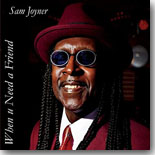 Sam
Joyner was born in Chicago, but spent his
summers in Mississippi. In the tiny Delta
community of New Africa, where his father served
as a preacher. Joyner was immersed in the
country life, with mules, roosters, and family.
He’s advanced to the I.B.C. finals in 2017 and
2018. As an adult, he’s traveled all over the
world, playing with a host of blues men
including Benny Turner, Larry Garner, and
members of the Neal family, but based on the
music on When U Need A Friend (Sam Joyner
Music), his heart lies on the path between New
Orleans, Mississippi, and Chicago. This most
excellent release features 10 songs, nine
written by Joyner.
Sam
Joyner was born in Chicago, but spent his
summers in Mississippi. In the tiny Delta
community of New Africa, where his father served
as a preacher. Joyner was immersed in the
country life, with mules, roosters, and family.
He’s advanced to the I.B.C. finals in 2017 and
2018. As an adult, he’s traveled all over the
world, playing with a host of blues men
including Benny Turner, Larry Garner, and
members of the Neal family, but based on the
music on When U Need A Friend (Sam Joyner
Music), his heart lies on the path between New
Orleans, Mississippi, and Chicago. This most
excellent release features 10 songs, nine
written by Joyner.
Joyner opens with “Must Be
Jelly,” a funky R&B-based blues. The title has
been used a few times for other songs, but this
is a Joyner original. It has a smooth, sexy feel
which sets the tone for the rest of the album
perfectly. “Goin’ To Chicago” is a New
Orleans-flavored track singing the praises of
the Windy City and it’s rich blues history that
really puts the spotlight on Joyner’s skills on
the keys, while “Hard 4 Tha Money” is a
mid-tempo blues adaptation of Frankie Paul’s
reggae tune “Work Hard,” and features Lil Ray
Neal’s crisp guitar work.
“Them Bluez” is an energetic
traditional-yet-modern blues with more inspired
piano from Joyner, and “Breakin’ Up Our Happy
Home” is a splendid slow blues, again featuring
Neal on guitar, with a terrific conclusion.
“Nothin’ You Can Do About Luv” brings it back to
the Crescent City with that irresistible second
line rhythm provided by New Orleans drummer
Mayumi, and “Natural Born Luvah” really swings.
“Onions Ain’t The Only Thing” is a strong
soul-blues track, previously appearing on the
2018 I.B.C. #33 CD.
“Sam Joyner In Tha House” is a
fun song about the Vicksburg I.B.C. (who Joyner
represented at the Memphis competition in 2017
and 2018) that surely had the audience on their
feet dancing in the aisles. The mellow and
soulful title track wraps things up with a warm
vocal from Joyner and some tasty slide guitar
backing from Marc Stone.
Joyner is joined on several of
the tracks by members of his own band (SunDanze
– guitar, Spencer Williams – bass), along with
members of Benny Turner’s band (Turner, playing
bass on a couple of tracks, plus Jeffrey
“Jellybean” Alexander – drums, and Keiko –
keyboards), guitarists Seizo, Mr. Kool, Harry
Sterling, and Dan Aguilar, bassist Miguel
Hernandez, drummer Gralin Neil (of the
aforementioned Neal family), and backing
vocalists Sue Ann Carwell, Karin Danger, plus
horns, strings and keyboards from Spring and
Kevin Hayes.
When U Need A Friend has
been a favorite of mine since I first plugged it
in. It captures a little bit of all the things I
really like about the blues, whether mixing
blues, soul, and R&B or even the regional
flavors (a bit of New Orleans, a bit of Chicago,
and a bit of Malaco). I certainly hope to hear
more from Sam Joyner in the near future.
--- Graham Clarke
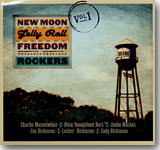 The
New Moon Jelly Roll Freedom Rockers came
together during a Charlie Musselwhite/Mavis
Staples tour. The North Mississippii Allstars
served as the house band during the tour.
Musselwhite and Luther Dickinson bonded on the
tour bus while discussing the blues. The group
name came about before the album or the band. In
2007, the Dickinsons (brothers Luther and Cody)
invited Musselwhite, Alvin Youngblood Hart,
Jimbo Mathus, and their dad, Jim to the party at
their Zebra Ranch studio, along with Chris Chew
(bass) and Paul Taylor (tub bass), calling it a
“potluck” recording session.
The
New Moon Jelly Roll Freedom Rockers came
together during a Charlie Musselwhite/Mavis
Staples tour. The North Mississippii Allstars
served as the house band during the tour.
Musselwhite and Luther Dickinson bonded on the
tour bus while discussing the blues. The group
name came about before the album or the band. In
2007, the Dickinsons (brothers Luther and Cody)
invited Musselwhite, Alvin Youngblood Hart,
Jimbo Mathus, and their dad, Jim to the party at
their Zebra Ranch studio, along with Chris Chew
(bass) and Paul Taylor (tub bass), calling it a
“potluck” recording session.
Stony Plain Records founder
Holger Petersen found out about the session and
inquired about releasing it to the public, so
Luther Dickinson and engineer Kevin Houston
finished up production on the set. Stony Plain
has released Volume 1 of the set with a
second volume to be released this spring.
Volume 1 is a ten-song set of mostly
familiar songs that have the feel of a loose jam
session that should bring a smile to any blues
fan’s face over the joy and exuberance that can
be heard, and felt, through each tune.
Each artist brought a couple of
songs to the proceedings. Musselwhite’s
contributions include a pair of originals, the
boogie shuffle “Blues, Why You Worry Me”
(originally recorded on his 1993 album, In My
Time) and the intense “Strange Land,” which
he wrote at age 18. Great guitar work by Luther
Dickinson on this track, by the way. Musselwhite
also tackles the Memphis Jug Band standard “K.C.
Moan,” a languid country blues take with
harmonica, banjo, and backing voices.
Mathus does his original tune,
“Night Time,” a swampy, funky slow burner that
generates plenty of heat and humidity, and a
wonderfully wild take on the pre-war classic
“Shake It And Break It,” which sounds like it
would have been a ball to watch being recorded.
Hart tackles another tune associated with
Charley Patton, a gritty take on“Pony Blues”
(how I wish he’d grace blues fans with another
recording), as well as the Mississippi Shieks’
“Stop And Listen Blues” and a terrific
bluesified reading of Jimi Hendrix’s “Stone
Free.”
The late Jim Dickinson (Luther
and Cody’s dad) passed away about two years
after this session. Long regarded as a roots
music icon, he does little to dispel that notion
with his two tracks, the rowdy barrelhouse
oldie, “Come On Down To My House,” a track that,
more than any other on the disc, reflects the
genial, good-natured tone of the session. His
other tune is Wilbert Harrison’s “Let’s Work
Together,” a wild and wooly cover carried by
Dickinson’s raw vocal and the raucous musical
backing.
Listening to Volume 1 of
this fantastic jam session, one has to ask two
questions. One, why did this sit on the shelf
for so long, and, two, when is Volume 2
being released?
--- Graham Clarke
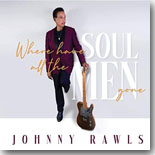 Where
Have All the Soul Men Gone is the third
release by soul/blues stalwart Johnny Rawls
on Third Street Cigar Records. For this release,
Rawls traveled to Denmark (where he recorded his
recent Live In Europe album, released by
a Dutch label) and is backed by the Ozdemirs (Kenan
Ozdemir – guitar/vocals, Levent Ozdemir –
drums/vocals, and Erkan Ozdemir – bass) and
keyboardist Alberto Marsico. Overdubs were added
in Waterville, Ohio by Marsico, Larry Gold –
guitarist, and the Waterville Horns (Travis
Geiman – trombone, Mike Williams – alto sax).
Where
Have All the Soul Men Gone is the third
release by soul/blues stalwart Johnny Rawls
on Third Street Cigar Records. For this release,
Rawls traveled to Denmark (where he recorded his
recent Live In Europe album, released by
a Dutch label) and is backed by the Ozdemirs (Kenan
Ozdemir – guitar/vocals, Levent Ozdemir –
drums/vocals, and Erkan Ozdemir – bass) and
keyboardist Alberto Marsico. Overdubs were added
in Waterville, Ohio by Marsico, Larry Gold –
guitarist, and the Waterville Horns (Travis
Geiman – trombone, Mike Williams – alto sax).
Rawls wrote all ten tunes and,
as always, the songs and his arrangements have
the knack of sounding vintage and contemporary
at the same time. The title track finds the
singer lamenting the passing of his heroes Z.Z.
Hill, O.V. Wright, B.B. King, Bobby “Blue”
Bland, and others, but declaring that he’s still
doing his best to “keep the dream alive.” The
uplifting “Bottom To The Top” tells of a woman
who’s turned his life around for the better, and
“Can’t Leave It Alone” continues the theme with
Rawls declaring he’s in it for the long haul.
Fans of old school soul can
breathe a sigh of relief with “Keep On Doing My
Thing,” as Rawls lets us know that he’s not
going anywhere and plans to play and sing for
the duration. Meanwhile, the slow burner “Love,
Love, Love” features a splendid blues guitar
intro (Geiman’s trombone is prominent here and
on other tracks and it adds a nice dimension to
these tracks. I wish more artists featured this
instrument), and “Money” is a profound track ---
it’s the root of all evil, but you gotta have
it.
The up-tempo “Town Too Small”
describes “the strange situation we livin’ in
today,” which is something everyone can relate
to right now. On the reflective “Time,” Rawls
ponders its inevitable passage, despite our best
efforts. The upbeat “Baby, Baby, Baby” is a
declaration of love for his lady, and on the
jubilant closer, “Calling On Jesus,” Rawls and
company take listeners to church with a tune
that will have them dancing in the aisles.
Thankfully, there are still a
few soul men helping keep the genre alive these
days, of which Rawls is one of the standard
bearers. His mentors of the past would be proud
that he’s taken over for them in keeping the
music alive. Where Have All the Soul Men Gone
is must-listening for soul/blues fans.
--- Graham Clarke
 Tom
Gilberts’ second release on Polymerase
Records, Old School, finds the
Oregon-based guitarist teaming up with Brian
Foxworth (drums) and Cave Captein (bass) for an
engaging set of blues and blues rock originals.
Gilberts’ guitar work is front and center on
this set, which consists of mostly instrumentals
that prove he’s one of the finest guitarists
currently practicing in any particular genre.
One would be hard-pressed to disagree after
listening to this marvelous set.
Tom
Gilberts’ second release on Polymerase
Records, Old School, finds the
Oregon-based guitarist teaming up with Brian
Foxworth (drums) and Cave Captein (bass) for an
engaging set of blues and blues rock originals.
Gilberts’ guitar work is front and center on
this set, which consists of mostly instrumentals
that prove he’s one of the finest guitarists
currently practicing in any particular genre.
One would be hard-pressed to disagree after
listening to this marvelous set.
Opening with the magnificent
slow blues, “’Lady’ Luck,” which would only work
if you were the kind of guitarist that Gilberts
is. He really takes his time on this track on
guitar and with his smoky, soulful vocal. What a
start! The swinging instrumental, “Zoot Suite
Shuffle,” could have continued far beyond its
two-minute running time, and the funky “Ass, Gas
or Grass” is a laid-back blues rocker with a
cool slide guitar run, while the melodic
instrumental “Sun Vibe” is first rate, subtle
with an Americana feel.
The lively title track is a
brisk shuffle with more tasty slide guitar, with
Gilberts singing of the virtues of doing things
the old-fashioned way. The acoustic
instrumental, “Dark Clouds,” adds a bit of jazz
into the mix with the rhythm section really
locking in behind Gilberts’ skillful fretwork.
It’s followed by “My Paper Bag,” a blues rock
instrumental with a Texas feel, and “The North
Fork,” another jazzy instrumental but completely
electric this time around. “You Missed Me” is a
mid-tempo shuffle about a broken relationship.
“Brown’s Camp” is a rootsy
instrumental piece with a bit of a southern rock
vibe, “Nighttime” is another slow burner with an
understated vocal from Gilberts and a jazzy
Latin tinge in the melody, and on the rock-edged
closer, “The Fuzz,” the guitarist pulls out all
the stops with loads of Hendrixian distorted
guitar tone as the album goes out in a blaze of
glory.
If you’re a blues fan, or a
blues rock fan, Old School deserves a
spot in your collection. Tom Gilberts is an
incredible guitar player who knows his way
around both genres, and is a great singer and
songwriter to boot. Producer Terry Robb gets the
absolute best out of Gilberts and the excellent
rhythm section. This is a great set from start
to finish.
--- Graham Clarke
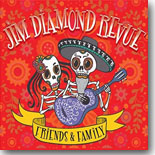 The Jim Diamond Revue is
an offshoot of Jim Diamond & the Groove
Syndicate, one of the leading blues bands in the
Ohio/Tennessee Valley for over 30 years. The
Revue expands the Groove Syndicate’s traditional
five-piece setup to include a host of musical
guests that really opens up the band’s sound
more than ever, venturing from their usual
soul-blues mix to include influences from New
Orleans to Memphis to funk and rock. All of
these sounds are perfectly captured on the
Revue’s latest release, Friends & Family.
The Jim Diamond Revue is
an offshoot of Jim Diamond & the Groove
Syndicate, one of the leading blues bands in the
Ohio/Tennessee Valley for over 30 years. The
Revue expands the Groove Syndicate’s traditional
five-piece setup to include a host of musical
guests that really opens up the band’s sound
more than ever, venturing from their usual
soul-blues mix to include influences from New
Orleans to Memphis to funk and rock. All of
these sounds are perfectly captured on the
Revue’s latest release, Friends & Family.
The band certainly knows how to
swing, as evidenced on their first few tracks,
the rollicking “I’m Cryin’,” the rocking “Dog
House,” and the fast-paced “Tight Mini Skirt”
(with terrific harmonica from guest Hank
Mowery). “Better Way” is a nice ballad with a
bit of a gospel feel, similar to the Allman’s “Soulshine,”
and “Sometime In June” is a gloriously funky
instrumental that moves back and forth between
Latin and Southern rock, while “See The Light”
is pure unvarnished blues rock.
The swinging shuffle, “Tell Me,”
is a real toe-tapper, and “Rock ‘N Roll Over
Over You” revisits the Latin rock/blues feel
from a couple of tracks back with nice guitar
work from Diamond and keyboards from Jon
Pleasant. The breathless swinger, “Hot For You,”
is a standout, as is “I’m Walkin’,” with it’s
funky Crescent City feel. “Hi-Dee-Hey,
Hi-Dee-Ho” is straight blues with scorching
slide guitar from guest Joe Litteral.
“Cannonball” is a horn-fueled instrumental that
drives like a freight train, and the closer, “15
Below,” is a smoky slow blues.
Diamond and the Groove Syndicate
(Beth Deminski Boyington – drums, Chris Herndon
– rhythm guitar/vocals, Mark Wagner – bass, Joe
DiGuiseppe (tenor sax), and Pleasant
(organ/piano) are augmented on assorted tracks
by guests Ray Warfield (tenor sax), Ryan Stiles
(tenor/baritone sax), Litteral (lead guitar),
Nick Mowery (lead guitar, harmonica, vocals),
Rob Brown (piano), Rod Wurtele (organ), and Bob
Ramsey (mellotron).
The title Family & Friends
is an appropriate one, because these musicians
have extraordinary chemistry, as if they’ve been
playing together for years, and, truthfully,
they have. Their affection for each other, and
the music they’re playing, comes through time
and time again.
--- Graham Clarke
 In
March of 2017, Mark Telesca was diagnosed
with Non-Hodgkins Lymphoma and endured surgery
and chemotherapy treatments, confined to his
home for most of that year. The
singer/songwriter/guitarist has been in
remission for over two years, doing well, and
celebrated his recovery in 2020 by publishing a
book, Love Music Hate Cancer, and
releasing Higher Vibrations, a wonderful
set of acoustic blues consisting of nine
originals and six blues and gospel covers.
In
March of 2017, Mark Telesca was diagnosed
with Non-Hodgkins Lymphoma and endured surgery
and chemotherapy treatments, confined to his
home for most of that year. The
singer/songwriter/guitarist has been in
remission for over two years, doing well, and
celebrated his recovery in 2020 by publishing a
book, Love Music Hate Cancer, and
releasing Higher Vibrations, a wonderful
set of acoustic blues consisting of nine
originals and six blues and gospel covers.
Telesca’s originals include “99
Years,” which tells of an innocent person
trapped behind bars, perhaps a metaphor for his
nearly year-long exile during his illness,
“Black Dress,” which finds him begging his lady
to hurry and get ready for a show that they’re
about to miss, the hopeful “Looking For Some
Gold,” and “Turn On A Dime,” a haunting ballad
telling listeners to not take anything in life
for granted.
Telesca funks things up a bit on
the upbeat “It’s All Right,” paints a vivid
picture of Manhattan in “Life in the City,” and
ponders his own mortality as he revisits the
prison theme of the opener. The somber “Been A
Long Time” finds him reflecting on the past, and
on the lively closer, “Somethin’ Just Ain’t
Right,” he discovers that his significant other
has hit the road.
I like Telesca’s choice of
covers, from Doctor Clayton’s oft-covered
“Murderin’ Blues,” to Mississippi Fred
McDowell’s “Louise,” Robert Johnson’s “Come On
In My Kitchen,” a dandy pair from Leroy Carr
(“How Long” and “Papa’s On The House Top”),
Blind Willie Johnson’s “Keep Your Lamp Trimmed
and Burnin,’” and a really interesting read of
Al Green’s “I’m A Ram.” While most of the covers
are familiar, Telesca’s nimble fretwork adds a
nice warm quality to them. His vocals are equal
to his guitar playing (he also plays bass and is
accompanied on several tracks by Bob Taylor on
snare drum).
Higher Vibrations is a
most excellent set of acoustic blues that will
certainly satisfy any fans of that particular
genre. It should satisfy anyone who just enjoys
great music. Survivor Mark Telesca has unleashed
a beauty that you’ll want to listen to all day
long.
--- Graham Clarke
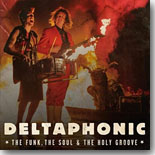 If
there were still record stores for us to visit,
the New Orleans ensemble Deltaphonic’s
music might be a bit of a challenge to track
down. Sure, they play blues (mostly of the Hill
Country variety), but they also include funk,
soul, and R&B, and LOTS of it, in their musical
gumbo. The title of their latest album is The
Funk, the Soul, & the Holy Groove, which
might give you an idea of the direction they are
coming from.
If
there were still record stores for us to visit,
the New Orleans ensemble Deltaphonic’s
music might be a bit of a challenge to track
down. Sure, they play blues (mostly of the Hill
Country variety), but they also include funk,
soul, and R&B, and LOTS of it, in their musical
gumbo. The title of their latest album is The
Funk, the Soul, & the Holy Groove, which
might give you an idea of the direction they are
coming from.
Deltaphonic (Andrew T. Weekes –
guitar/vocals, Paul Provosty – lead guitar, and
Trenton O’Neal and Ciaran Brennan – drums), is
joined on these ten tracks by bassist Jerry
“Jblakk” Henderson (of Big Sam’s Funky Nation),
keyboardist Andriu Yanovski, and backing
vocalist Josh Kagler.
The band gets right into it with
the opening cut, “Liars,” a deep funk rocker
that also serves as a scathing, satirical jab at
the music business. “Ghosts” sounds like a
mashup of Hill Country, funk, and smooth R&B,
with the combination working really well. “Bad
People” adds Southern rock to the already
percolating mix, while the slow groover
“Starlit” sounds like the best ’70s-era R&B.
“New Mexican Rockstar” has an old school rock
feel with a Latin rhythm, and the multi-faceted
“If It Don’t Bleed” revisits Hill Country blues
and rock.
The rock-edged “Don’t Have To Be
Good” scorches the earth before segueing into
the swampy “Mississippi,” which features some
tasty slide guitar from Provosty. “The
Denouement” settles into a relaxed groove with
Yanovski’s keyboards providing a soulful cushion
backing Weekes’ expressive vocal, and the
closer, “See Red,” mixing hard rocking guitar
with that hypnotic Hill Country rhythm.
The mix of genres is never
off-putting and the sudden tempo changes in
several songs is particularly well done,
guaranteed to hold the interest of the
listeners, if Weekes’ lyrics aren’t already
doing that. There’s a lot of music to take in
with Deltaphonic, but it’s all so well-crafted
that you won’t even realize it.
--- Graham Clarke
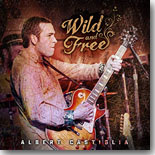 Albert
Castiglia’s most recent effort, Wild and
Free (Gulf Coast Records), was recorded live
at the Boca Raton club The Funky Biscuit in
early 2020 in front of an obviously enthusiastic
crowd. The Florida-based guitarist and his band
(Justine Thompson – bass/vocals, Ephraim Lowell
– drums) are joined by Lewis Stephens
(B3/piano), along with guests Mike Zito (guitar)
and John Ginty (B3) for several songs on this
strong 11-track set of originals and covers.
Albert
Castiglia’s most recent effort, Wild and
Free (Gulf Coast Records), was recorded live
at the Boca Raton club The Funky Biscuit in
early 2020 in front of an obviously enthusiastic
crowd. The Florida-based guitarist and his band
(Justine Thompson – bass/vocals, Ephraim Lowell
– drums) are joined by Lewis Stephens
(B3/piano), along with guests Mike Zito (guitar)
and John Ginty (B3) for several songs on this
strong 11-track set of originals and covers.
The thunderous “Let The Big Dog
Eat” (a highlight from Castiglia’s 2016 release,
Big Dog) kicks off the disc and serves
notice to what’s ahead. The rocking shuffle,
“Hoodoo On Me,” was written by Zito, keeping up
the show’s brisk pace. Brian Stoltz’s funky “I
Been Up All Night” slows the pace a bit, but not
very much, and Castiglia unleashes some serious
fretwork on this track, before moving to the
ballad, “Heavy,” a Castiglia original with
interesting lyrics and fine vocals and guitar.
Meanwhile, the next track, the furious and
frenetic “Get Your Ass In The Van,” is Elmore
James on steroids, so slide guitar fans should
love it for sure.
The funky mid-tempo “Searching
The Desert For The Blues” is a nice change of
pace, leading into Castiglia’s original “Keep On
Swingin’,” which picks up the pace and allows
for the guitarist to really stretch out and lock
in. Zito and Ginty join Castiglia on a wondrous
eight-plus minute cover of Johnny Winter’s “Too
Much Seconal.” The interplay between the two
guitarists is just spectacular on this track,
and Ginty’s B3 is typically marvelous. Ginty
also guests on a tasty read of Paul
Butterfield’s “Lovin’ Cup.”
The album closes with
Castiglia’s “I Tried To Tell Ya,” a muscular
blues rocker, and a furious cover of Freddie
King’s instrumental “Boogie Funk,” where the
guitarist blows the doors off the joint.
Wild and Free is a
powerful set of blues and blues rock that will
certainly please his fans and should bring a few
new ones into the fold who enjoy a rock edge
with their blues.
--- Graham Clarke
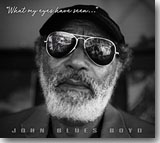 Eight
months ago, Bill Mitchell made What My Eyes
Have Seen….(Gulf Coast Records), from
John Blues Boyd, his Surprise pick for Blues
Bytes’
April issue. In my perpetual state of
bringing up the rear, I’m just now getting to
reviewing this one in my stack, but be advised
that I’m not going to tell you anything
different from what Mr. Mitchell said. My big
question is “Where in the world did this guy
come from????” Though he’s been active for a
number of years, he’s certainly seemed to have
slipped beneath the radar, which is a shame,
because, man, does he have a story to tell!
Eight
months ago, Bill Mitchell made What My Eyes
Have Seen….(Gulf Coast Records), from
John Blues Boyd, his Surprise pick for Blues
Bytes’
April issue. In my perpetual state of
bringing up the rear, I’m just now getting to
reviewing this one in my stack, but be advised
that I’m not going to tell you anything
different from what Mr. Mitchell said. My big
question is “Where in the world did this guy
come from????” Though he’s been active for a
number of years, he’s certainly seemed to have
slipped beneath the radar, which is a shame,
because, man, does he have a story to tell!
A Greenwood, Mississippi native
(from the Baptist Town area), Boyd moved to
Florida at 18 years old to escape the racial
tensions that permeated the area. He became a
roofer and met his wife, settling there for over
a decade before moving to Chicago and,
eventually, California. After nearly 40 years,
he retired to take care of his wife who suffered
from kidney failure. Upon his retirement in
2009, he began to think about music (he sang and
wrote songs as a youth before leaving
Greenwood), connecting with Kid Andersen and he
began performing around the Bay Area while still
tending to his wife. After his wife passed in
2014, Boyd traveled with Andersen to Europe and
released his first album in 2016, The Real
Deal, produced by Andersen at Greaseland
Studios.
What My Eyes Have Seen….is
the story of Boyd’s life, recounting his
departure from Mississippi (“Ran Me Out Of
Town”), his later career (“The Singing Roofer”),
his journey to the west coast (“California,”
inspired by Howlin’ Wolf), his love for his late
wife (“A Beautiful Woman (for Dona Mae)” and the
mournful “49 Years”), and his love for the blues
(“In My Blood,” “I Heard The Blues”). He also
discusses events in the world around him that
changed his life (the harrowing title track and
“Why Did You Take That Shot,” which discusses
the assassination of Dr. Martin Luther King). He
also sings of his determination to make a
difference in “I Got To Leave My Mark.” Also
mixed into the set are several interludes sung
by Boyd that set the stage for the songs to
come.
Boyd’s magnificent voice carries
the day on these songs, which were written by
him with Andersen and Gulf Coast Records head
man Guy Hale. Andersen is his usual versatile
self, playing guitar and organ and providing the
perfect backdrop for Boyd’s performances in a
variety of blues styles that succinctly mix
jazz, funk, and urban blues. Also contributing
are June Core (drums), Jim Pugh (keyboards),
Quintae Johnson (bass), and Nancy Wright, Eric
Spaulding, and Jack Sanford (saxes), Ryan Walker
(harmonica), Ric Feliziano (trombone), and John
Halbleib (trumpet).
It took a long time for John
Blues Boyd to achieve his musical dreams.
With What My Eyes Have Seen…., he is making
the most of his opportunity. Hats off to Kid
Andersen and Guy Hale for helping this amazing
artist get the message out to the audience he
deserves.
--- Graham Clarke
 If
you can’t find anything to like about Memphis
Loud (Ruf Records), the newest release from
Victor Wainwright and The Train, then you
probably shouldn’t be listening to music in the
first place. Sure, therels blues a’plenty
to be heard, as is to be expected from the
multi-BMA-winning singer/keyboardist, but he
deftly blends soul, rock, jazz, and R&B into the
mix as well. The fact that Wainwright does this
so well, and so effortlessly, explains why he
has built such a devoted following over the past
15 years.
If
you can’t find anything to like about Memphis
Loud (Ruf Records), the newest release from
Victor Wainwright and The Train, then you
probably shouldn’t be listening to music in the
first place. Sure, therels blues a’plenty
to be heard, as is to be expected from the
multi-BMA-winning singer/keyboardist, but he
deftly blends soul, rock, jazz, and R&B into the
mix as well. The fact that Wainwright does this
so well, and so effortlessly, explains why he
has built such a devoted following over the past
15 years.
Wainwright comes rocking out of
the gate with the rousing “Mississippi,” which
pays tribute to the Magnolia State, before
rolling into the Crescent City-flavored “Walk
The Walk,” a tune dedicated to his parents for
their love and support. The hard-charging title
track is about a train, a musical train, and
sounds like one that you might want to ride. The
jazzy “Sing” is a really cool track that will
take listeners back a century with the horns and
woodwinds, and the gripping “Disappear” is a
splendid blues ballad with a heartfelt vocal
from Wainwright.
The briskly-paced “Creek Don’t
Rise,” about a couple rekindling the fire in
their relationship, lifts the mood and the
tempo, and the funky “Golden Rule” manages to
bring to mind Memphis and New Orleans as it
carries you away. Meanwhile, on the somber
“America,” Wainwright encourages us to come
together to achieve a common goal, then lightens
things up considerably with the humorous, rootsy
“South End Of A Northbound Mule.” The
encouraging “Recovery” describes persevering
through difficult times and leaving them in the
dust, and the lively “My Dog Riley” is a
lighthearted tribute to Wainwright’s pup.
The closer is a magnificent soul
burner, “Reconcile,” running about eight and a
half minutes, but it seems to fly by as
Wainwright pours his heart and soul into the
performance. It certainly ends the album on a
high note.
Victor Wainwright never
disappoints with a new release, and Memphis
Loud continues that trend. Blues fans, as
well as fans of great music in general, will
play this one a lot.
--- Graham Clarke
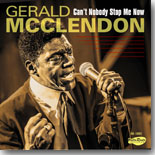 If
you happened to hear 2019’s Battle of the
Blues: Chicago Vs. Oakland, one of 2019’s
best releases, you got to hear Chicago vocalist
Gerald McClendon. He contributed only one
track, “Cold In The Streets,” but it was one of
the best tracks on the album. Fortunately for
soul blues fans Delta Roots Records, who
released the Battle… CD, has released a
complete album of McClendon’s work, Can’t
Nobody Stop Me Now, a fabulous set of
original songs (written by Delta Roots chief
Twist Turner, who also produced the album, wrote
all of the songs, and played drums) that prove
McClendon is the real deal.
If
you happened to hear 2019’s Battle of the
Blues: Chicago Vs. Oakland, one of 2019’s
best releases, you got to hear Chicago vocalist
Gerald McClendon. He contributed only one
track, “Cold In The Streets,” but it was one of
the best tracks on the album. Fortunately for
soul blues fans Delta Roots Records, who
released the Battle… CD, has released a
complete album of McClendon’s work, Can’t
Nobody Stop Me Now, a fabulous set of
original songs (written by Delta Roots chief
Twist Turner, who also produced the album, wrote
all of the songs, and played drums) that prove
McClendon is the real deal.
The optimistic title track opens
the disc on a positive note as McClendon vows to
move forward, leaving his past behind. Next is
the simmering soul of “Where Do We Go From
Here,” a heart-rending break-up song with
smoking sax from Skinny Williams backing
McClendon’s heartfelt vocal. Meanwhile, “Groove
On Tonight” is a smooth piece of funky R&B, “She
Don’t Love Me Anymore” is another heartfelt
ballad revisiting the end of a relationship, and
“Runnin’ Wild,” has a Stax feel, compliments of
the horns, as McClendon calls out his lady for
playing the field.
The blues ballad, “It’s Over
Now,” would have been a snug fit into Bobby
“Blue” Bland’s catalog, and McClendon's
sensitive read is sublime. The amusing “Mr.
Wrong” is an amusing track with a catchy refrain
that will leave listeners smiling, and the
redemptive “I Started Over” finds McClendon
testifying that he’s a new man. The ballad, “You
Can’t Take My Love,” is a standout, maybe the
best track on the disc, with the singer
delivering a measured yet supremely soulful
performance, and the tender “Why Can’t We Be
Together” follows in the same vein.
“Cut You Once” is a slightly
harrowing tale of a man caught in the act of
getting it on by his lady, and the closer, “I
Think About You,” is a great slice of
horn-fueled southern soul with a moving vocal
from McClendon.
Fans of soul music have gotten a
lot of bang for their buck this year, and
Can’t Nobody Stop Me Now sits near the top
of the list. McClendon is a dynamite vocalist
who does a fantastic job with this impressive
set of tunes from Twist Turner, who does an
excellent job providing a superb backdrop for
this singer who deserves to be heard.
--- Graham Clarke
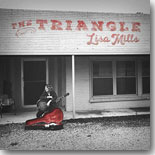 The
Triangle (Melody Place Music) is the title
of Lisa Mills’ new CD, describing the
musical triangle where most great music of the
south has originated over the past three
quarters of a century --- Memphis, Muscle
Shoals, Alabama, and Jackson, Mississippi. Mills
has recorded 14 classic blues and soul tracks
that had their origins in this region, with four
songs recorded at FAME Studios, five tracks at
Royal Studios, four tracks at Malaco Studios,
and a bonus cut from Sun Studios.
The
Triangle (Melody Place Music) is the title
of Lisa Mills’ new CD, describing the
musical triangle where most great music of the
south has originated over the past three
quarters of a century --- Memphis, Muscle
Shoals, Alabama, and Jackson, Mississippi. Mills
has recorded 14 classic blues and soul tracks
that had their origins in this region, with four
songs recorded at FAME Studios, five tracks at
Royal Studios, four tracks at Malaco Studios,
and a bonus cut from Sun Studios.
The first four, recorded at
FAME, include Little Richard’s “Greenwood,
Mississippi,” one of the best tracks in a
crowded field. Mills really takes this one to
the next level with her spirited vocal. There’s
a pair of Etta James tracks as well, both sides
of her 1967 single “Tell Mama” (taken with a
more pop/rock approach than the original) and
the B-side, “I’d Rather Go Blind.” These two
tracks bookend Clarence Carter’s timeless “Slip
Away,” which also features a fantastic vocal
from Millsthat really conveys pain and yearning.
The five tracks recorded at
Royal include Little Milton’s “That’s What Love
Will Make You Do,” a stellar track that
positively drips with Memphis grease funk. Bobby
Womack’s “I’m In Love” is one of his finest
compositions, and Mills covers it about as well
as it can possibly be done. The other three
tracks are the slow burner, “Same Time Same
Place” (originally recorded by Mable John), “A
Place Nobody Can Find” (by Sam & Dave), and
“That’s How Strong My Love Is” (recorded by O.V.
Wright and Otis Redding).
The tracks recorded at Malaco
include a feisty take on Denise LaSalle’s
“Someone Else is Stepping In,” the superb soul
ballad “I’ll Always Love You” (written and
originally recorded by Southern rockers The Beat
Daddys on Malaco’s Waldoxy subsidiary), the
Jackson Southernaires’ “Travel On,” which
seamlessly mixes blues and gospel, and a
stunning version of the Bobby “Blue” Bland’s
classic “Members Only,” which based on Mills’
masterful vocal may become the definitive
version of the song.
The bonus cut, from Sun Studios,
is just Mills and her guitar. “Just Walking In
The Rain” is a beautiful performance, with
Mills’ understated vocal and guitar sending the
album off on just the right note.
The Triangle is a
remarkable album, most definitely Lisa Mills’
best album to date and one of my favorites for
2020. It should remain on your permanent
rotation for quite some time.
--- Graham Clarke
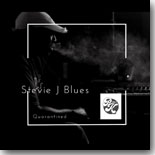 Stevie
J Blues recently released his Quarantined
album, which we will review in an upcoming issue
(spoiler: It’s really good!). The first single
from that effort is the album's opening track,
“Big Girls.” A dance party song that
celebrates the benefits and pleasures of
plus-sized ladies, it’s a tasty combination of
blues with ’70s-era R&B and a dash of modern
hip-hop. If you like any of those genres, this
one, not to mention the rest of the upcoming
album (due in mid-January) should be on your
must-purchase list. I’m just glad that Stevie J
Blues didn’t sit at home and mope around during
the pandemic, and you will be, too.
Stevie
J Blues recently released his Quarantined
album, which we will review in an upcoming issue
(spoiler: It’s really good!). The first single
from that effort is the album's opening track,
“Big Girls.” A dance party song that
celebrates the benefits and pleasures of
plus-sized ladies, it’s a tasty combination of
blues with ’70s-era R&B and a dash of modern
hip-hop. If you like any of those genres, this
one, not to mention the rest of the upcoming
album (due in mid-January) should be on your
must-purchase list. I’m just glad that Stevie J
Blues didn’t sit at home and mope around during
the pandemic, and you will be, too.
Elektro Horse is an
artist/DJ/producer from Chicago who has created
a new dance sound called CDM (Country Dance
Music). Recently, he collaborated with singer
Francesca Capasso for “Walk On Water,” a
gospel/blues/country track that’s sure to get
the congregations dancing in the aisles. Capasso,
a Stage 3 cancer survivor, really belts out this
entertaining and inspirational tune that
encourages listeners to count their blessings
and keep their faith through the hard times that
we all face. Elektro Horse is currently working
on his debut EP, so this one should please fans
of several overlapping genres.
--- Graham Clarke
 With this new album, Grass
Ain't Greener On The Other Side (CD Baby),
the nominal leader of New York-based Peter
Veteska & Blues Train takes a shift from
his usual funk and jazz recordings to put out a
decent but not great album of blues and
blues/rock. it meanders around a bit during the
collection of six originals and four covers. Veteska
is a strong blues guitarist but
doesn't have the voice to pull it off, which is
why I say the album is good but not great. Quite frankly, what gets this
album its recommended status is the keyboard
work of Jeff Levine on both piano and B3. He's a
very fine player, elevating everything here to a
higher level.
With this new album, Grass
Ain't Greener On The Other Side (CD Baby),
the nominal leader of New York-based Peter
Veteska & Blues Train takes a shift from
his usual funk and jazz recordings to put out a
decent but not great album of blues and
blues/rock. it meanders around a bit during the
collection of six originals and four covers. Veteska
is a strong blues guitarist but
doesn't have the voice to pull it off, which is
why I say the album is good but not great. Quite frankly, what gets this
album its recommended status is the keyboard
work of Jeff Levine on both piano and B3. He's a
very fine player, elevating everything here to a
higher level.
Among the keeper cuts are
the album opener, "Am I Wrong Pretty Baby," with Mikey Jr.
appearing on harmonica and Levine
immediately showing us that he's a force on the
B3. Levine opens the next cut, a cover of the
Dinah Washington and Brook Benton classic, "Baby
You've Got What It Takes," with singer Jen
Barnes joining the band to share vocals with
Veteska. If I had a vote, I would have had
Barnes appear on every song. Yeah, she's good. Levine's B3 solo
later in the cut is an absolutely killer.
Veteska gets more power into his
voice on the up-tempo blues shuffle," You Give
Me Loving." Needless to say, Levine provides
more solid B3 accompaniment, as he does on the
Willie Cobbs original, "You Don't Love Me," one
that also gives Veteska plenty of room to
stretch out on guitar. Mikey Jr. returns for the
12-bar blues, "I've Been Missing You," with
Veteska switching over to acoustic guitar.
Another fine cover is Ray Charles' up-tempo
blues, "Heartbreaker," with Levine (who else?)
opening the song with a B3 intro.
For my money, Levine is the star
of this show, but there's enough else to give
Grass Ain't Greener On The Other Side a
solid recommendation.
--- Bill
Mitchell
 Canadian singer / harmonica
player David Rodundo was honored to have none
other than Lee Oskar produce his latest album,
So Much Trouble (Dreams We Share), billed
to David Rotundo Band. The dozen cuts here
represent several different styles of blues. I'm
a big fan of the blues harmonica so, based on
what I read in the accompanying press release, I
was expecting to be blown away by the quality of
harp work, especially considering that Oskar
was involved in the production.
Canadian singer / harmonica
player David Rodundo was honored to have none
other than Lee Oskar produce his latest album,
So Much Trouble (Dreams We Share), billed
to David Rotundo Band. The dozen cuts here
represent several different styles of blues. I'm
a big fan of the blues harmonica so, based on
what I read in the accompanying press release, I
was expecting to be blown away by the quality of
harp work, especially considering that Oskar
was involved in the production.
Unfortunately, I was
underwhelmed. There really wasn't anything that
I couldn't hear at the corner bar on jam session
night. Rotundo is fine technically on the
instrument, but many of his solos sounded
similar, and he doesn't have the vocal chops to
counter it. This album is also designed to
challenge the listener to step outside their
pre-determined box of what the blues should be,
and I'm always fine with that, but there has to
be something outside that box that intrigues my
ears. Instead, too many of the songs had the
comment of 'No' or '"Meh' in my notes.
There's enough here to make an
interesting EP but not a full album. The
up-tempo blues that opens the album, "She's
Dynamite," gets the blood flowing, with Rotundo
playing decent harmonica to carry the tune. The
real keeper here is the acoustic Delta blues
number, "Hard Times Coming," when Rotundo picks
up a guitar to go with his harp playing. His
harmonica work is complemented by solid sax and
B3 on the novelty shuffle, "Drinking Overtime."
I was hoping for a nice closing number with the
cover of "Trouble In Mind," but this version
lacks energy.
Anytime I give a lackluster
review of an album I do so with the caveat that
your results may vary. Check out samples before
deciding whether or not you want to buy it, but
So Much Trouble is not for me.
--- Bill Mitchell
 Live At The Isabel has
introduced me to Canadian singer Miss Emily,
who I found to be a strong singer with plenty of
range. She's got a couple of previous
independent releases, earned a Maple Blues Award
for Female Vocalist of the Year and New Artist
of the Year, and there's a testimonial from Gene
Simmons of Kiss (of all people) in the press
material.
Live At The Isabel has
introduced me to Canadian singer Miss Emily,
who I found to be a strong singer with plenty of
range. She's got a couple of previous
independent releases, earned a Maple Blues Award
for Female Vocalist of the Year and New Artist
of the Year, and there's a testimonial from Gene
Simmons of Kiss (of all people) in the press
material.
Now that I've heard Live At
The Isabel, I need to explore more
recordings from Miss Emily. There's good stuff
here, spotlighting Miss Emily's powerful voice
with plenty of range and her tasteful piano
playing. She's very talented and could be a star
in the making. The reason I want to hear more is
that after listening to Live At The Isabel
several times through I started feeling like I
was missing some of the energy of the live show.
The sound is clean, perhaps too clean and not
warm enough, and I feel like I bought the last
ticket to the show and am listening from the
back row of the auditorium.
But my minor complaints about
the sound and the overall feel of the music
shouldn't diminish my respect for Miss Emily as
an artist. She sings her ass off and pumps
plenty of emotion into her songs. I'm especially
fond of the amazing vocals on her own
composition, "Three Words," and then next on a
version of "The Letter," on which she also
played very nice piano. Jon 'Bunny' Stewart
comes in with a strong sax solo. While not a
true blues song, "The Letter" may be the
strongest cut here.
The Bill Withers song, "Who Is
He," gets good coverage here. (Sidenote: I'm
hearing more of Bill Withers' material being
covered by blues artists lately, and that's a
good thing). Miss Emily plays some of her best
piano on the slow ballad "Blue Is Still Blue."
Her vocals then get a little sassy on "Dear CBC,"
as she spills out her frustration with not
getting airplay on that network's stations. She
also shines on an original number, "The
Sell-Out," on which she pours out a volcano of
emotion, especially as the tune progresses. By
the end of the song, I was shouting, "Wow!"
There's a very fine studio album from
Miss Emily waiting to happen. I'll be eagerly
waiting for it to show up in my mailbox in the
future. It took me a few times through Live
At The Isabel before this one grabbed me,
but now I've claimed my seat on the Miss Emily
bandwagon. My patience and perseverance has been
rewarded. With a full show of 15 songs here,
there's plenty of quality music to enjoy.
--- Bill Mitchell